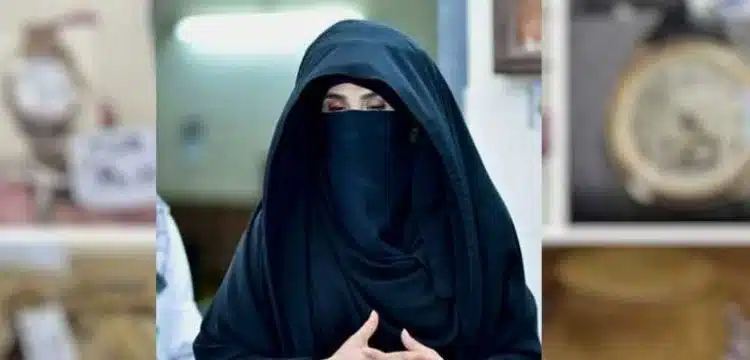[vc_row][vc_column][vc_column_text dp_text_size=”size-4″]RAWALPINDI – In the wake of the Toshakhana reference case, Bushra Bibi, the wife of Imran Khan, the founder of Pakistan Tehreek-e-Insaf (PTI), has been handed a 14-year sentence. In response to this verdict, Bushra Bibi voluntarily presented herself at Adiala Jail.
In the course of today’s legal proceedings at Adiala Jail, Judge Muhammad Bashir delivered the judgment in the absence of Bushra Bibi. Subsequent to the court’s decision, Bushra Bibi, utilizing her personal vehicle, arrived at Adiala Jail to surrender herself. The National Accountability Bureau (NAB) team was already present at the scene and took her into custody. Both Bushra Bibi and the PTI founder are slated to be housed in separate cells within the jail.
Read more: Imran Khan And Bushra Bibi Sentenced 14 Years Jail In Toshakhana Case
Given the prevailing national circumstances, the external security measures at Adiala Jail have been heightened by law enforcement authorities. Additional security personnel have been strategically stationed at the front, rear, and surrounding areas of the jail premises to fortify its security.
This development marks a significant turn of events for Bushra Bibi, who now finds herself entangled in legal proceedings stemming from the Toshakhana reference case. The gravity of the situation prompted her decision to surrender and comply with the legal processes unfolding at Adiala Jail.
The hearing, conducted by Judge Muhammad Bashir, transpired in Bushra Bibi’s absence, indicating the subsequent nature of her decision to surrender. The NAB team’s pre-emptive presence at Adiala Jail underscores the swift response to enforce the court’s verdict.
As Bushra Bibi and the PTI founder prepare to serve their respective sentences in separate cells, the legal ramifications of the Toshakhana reference case come to the forefront. The details of the case, leading to a 14-year sentence, imply a substantial legal reckoning for the individuals involved.
In light of the heightened national situation, the reinforcement of external security at Adiala Jail underscores the authorities’ commitment to maintaining order and security during this critical period. The strategic deployment of additional security personnel aims to safeguard the jail premises from any potential disturbances or security breaches.
The PTI founder’s association with this legal case adds a layer of complexity to the situation, attracting increased public and media attention. The decision to keep Bushra Bibi and the PTI founder in separate cells within the jail indicates a procedural adherence to standard practices, ensuring the integrity of the legal process.
While the specifics of the Toshakhana reference case remain central to these developments, the broader implications extend to the political landscape, given the prominence of the PTI founder. The case has the potential to influence public perception and political discourse, making it a focal point for discussions on governance and accountability.
As Bushra Bibi surrenders herself to the legal proceedings, the coming days will likely witness increased scrutiny and analysis of the Toshakhana reference case. The separation of the PTI founder and his wife within the jail adds a layer of intrigue to the unfolding events, prompting questions about the impact on the political dynamics of the country.
In conclusion, the surrender of Bushra Bibi in the aftermath of the 14-year sentence in the Toshakhana reference case marks a significant development in the legal and political landscape of Pakistan. The heightened security measures at Adiala Jail reflect the gravity of the situation, emphasizing the authorities’ commitment to maintaining order during this critical juncture. The subsequent legal proceedings and the separate confinement of Bushra Bibi and the PTI founder underscore the intricate nature of the case and its potential ramifications on both individual lives and the broader political spectrum.[/vc_column_text][/vc_column][/vc_row]











